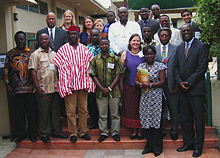The IMF and Civil Society

Some of the participants of the IMF, World Bank and WCC meeting in Accra, Ghana.
IMF and World Bank Dialogue with African Church Leaders
September 3, 2008
Teams from the IMF, World Bank and the World Council of Churches (WCC) met in Accra, Ghana, on August 28-29 for a dialogue centered on poverty and focused on Africa. Timed to precede the High Level Forum on Aid Effectiveness in Accra, the meeting represented a continuation of a dialogue process launched in 2002, which previously produced a 2004 meeting of the leadership of the three institutions in Geneva.
The main objective of the Accra meeting was to move the dialogue from the global to the local and regional levels: to examine the effectiveness on the ground of policies supported by the IMF and World Bank, and to shed more light on the role of churches and faith-inspired organizations in development.
Participants included 24 church leadersmost from Ghana and others from Anglophone Africaincluding the Anglican and Methodist bishops of Gambia and Ghana. The IMF team comprised Bassirou Sarr and Jenny Bisping from IMF External Relations Department and Arnold McIntyre, the IMF Resident Representative in Ghana. The Bank was represented by Katherine Marshall and Brady Walkinshaw from the Development Dialogue on Values and Ethics, and Katherine Bain, Christopher Jackson, Daniel Boayke, and Kofi Tsikata from the Ghana World Bank Country Office. Gerrie ter Haar, Chair in Religion and Development at the Institute of Social Studies in The Hague, moderated the meeting.
The encounter was remarkably frank in tone. It was structured around three sessions: the role of the IMF, World Bank and WCC in Africa, aid effectiveness and governance, and a Ghana case study. The WCC has been — and remains — critical of the Bank and Fund in areas of trade policy, institutional governance, and past policies of structural adjustment. Strong feelings about these issues persist, or as one participant said: "The past is always present in the present." Nonetheless, the discussion moved beyond finger-pointing.
Fund and Bank speakers talked about the critical issues Africa faces after a period of remarkable growth. They also described what each institution is doing and hoping to achieve in the region. They made a strong case for ownership. "The countries themselves have to take responsibility," said McIntyre of the Fund. He said that the IMF and World Bank can support governments in their efforts, but the ultimate responsibility lies with the goverments themselves. This is also applicable to the networks of religious leaders and member churches — representing about 120 million Africans — that have become important advocates of development policy at the country and regional levels and that play a crucial role in delivering services. But there is much room for strengthening their advocacy role both in respect to holding their governments accountable and mobilizing their own memberships. As one church participant said: "We must take responsibility for our own development."
A number of issues emerged from the meeting:
- Aid effectiveness and governance (particularly government ownership, accountability, and transparency) are high on the agenda of faith leaders in Africa. These issues may be where dialogue is needed most, especially as IMF and World Bank optimism about Africa's development, based on positive economic indicators, is often not shared by the church leaders, given their experiences on the ground.
- At the country level, faith leaders and organizations often identify themselves as separate from other members of civil society and thus operate in relative isolation from those groups. Church leaders are deeply frustrated by their lack of voice in and limited information on the national development dialogue.
- Agricultural policyspecifically on riceis an area of concern to the WCC and religious leaders who are witnessing an increase in rural poverty.
- Religious leaders perceived a growing need to improve the capacity of faith-inspired organizations that deliver the services that for the poor often are vital safety nets.
In a final round of comments, all participants in the meeting attested to the need for more engagement. One bishop noted that "when a bishop tells you he has learned something new, that means that many others will continue learning." Participants came up with concrete proposals for information sharing and continuous engagement. As a first step, the three institutions agreed on a country-level policy dialogue with Ghanaian religious institutions on a quarterly basis. There will also be a stocktaking on how to best continue the dialogue between the three institutions.
